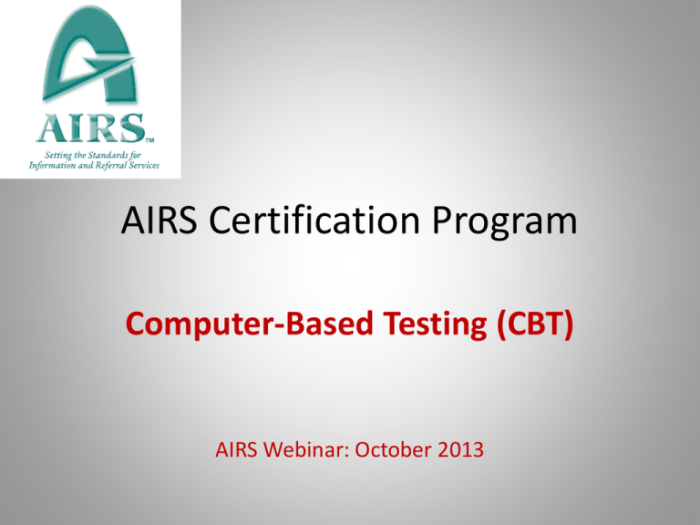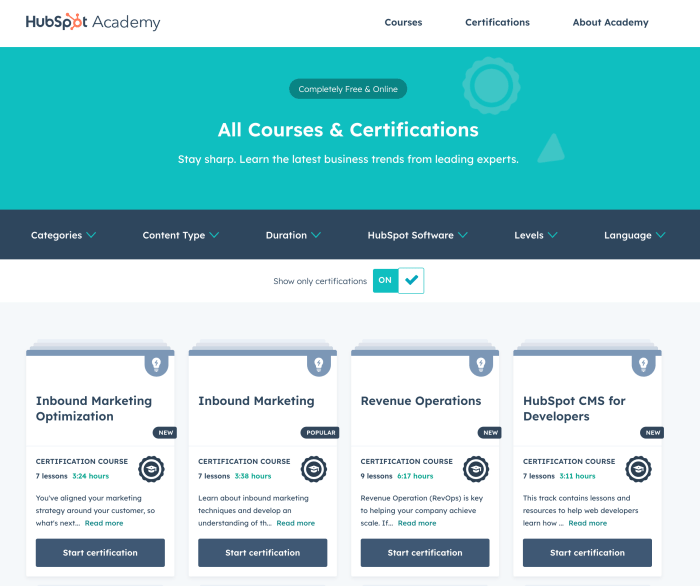Is airs certification worth it – Whether Airs certification is worth pursuing is a question that has been pondered by many. In this comprehensive guide, we delve into the topic, exploring the value proposition, career impact, return on investment, and more. Join us as we unravel the intricacies of Airs certification and help you make an informed decision.
Value Proposition of Airs Certification
The Airs certification is a highly sought-after credential in the field of information security. It validates an individual’s expertise in designing, implementing, and maintaining secure IT systems.
Obtaining Airs certification offers numerous benefits to professionals, including:
- Enhanced Credibility: Airs certification demonstrates an individual’s mastery of information security concepts and best practices, establishing them as a trusted expert in the field.
- Career Advancement: Airs certification opens doors to career advancement opportunities, as organizations prioritize candidates with proven expertise in securing IT infrastructure.
- Increased Earning Potential: Certified professionals often command higher salaries and are eligible for promotions and leadership roles within their organizations.
Case Study:
John, an IT security engineer, obtained his Airs certification in 2022. Within a year, he was promoted to a senior security analyst role, where he is responsible for leading the implementation of a comprehensive security program for his company. The Airs certification provided him with the knowledge and skills necessary to excel in his new position and contribute to the organization’s security posture.
Career Impact of Airs Certification

Obtaining an Airs certification can have a significant impact on one’s career trajectory and earning potential. It demonstrates a high level of proficiency in data science and analytics, making individuals highly sought after in the job market.
Industries and Job Roles Valuing Airs Certification
Airs certification is particularly valued in industries that heavily rely on data analysis, such as technology, finance, healthcare, and manufacturing. Within these industries, job roles such as data scientists, data analysts, and business intelligence analysts highly benefit from Airs certification.
Data and Statistics
Studies have consistently shown a positive correlation between Airs certification and career success. For instance, a survey by the American Statistical Association found that certified data scientists earned an average of 15% more than their non-certified counterparts.
Return on Investment for Airs Certification: Is Airs Certification Worth It
Obtaining Airs certification can be a valuable investment in your career, but it’s important to consider the potential return on investment (ROI) before making a decision. The ROI of Airs certification depends on several factors, including certification costs, time commitment, and career benefits.
Calculating ROI
To calculate the ROI of Airs certification, you can use the following formula:“`ROI = (Benefits
Costs) / Costs
“`where:* Benefits = Increased earning potential, career advancement opportunities, and professional recognition
Costs = Certification fees, study materials, and time spent studying
The benefits of Airs certification can be significant. According to a study by the International Association of Risk Management (AIRMIC), Airs-certified professionals earn an average of 10-15% more than their non-certified counterparts. In addition, Airs certification can open doors to new career opportunities and enhance your professional reputation.The
costs of Airs certification can vary depending on the certification level and the training provider. However, the average cost of Airs certification is around $2,000-$3,000. The time commitment required to study for the Airs certification exam is also significant. Most candidates spend around 100-150 hours studying for the exam.Based
on these factors, the ROI of Airs certification can be calculated as follows:“`ROI = ((10%
- Current Salary)
- $2,500) / $2,500
“`For example, if your current salary is $50,000, the ROI of Airs certification would be:“`ROI = ((10%
- $50,000)
- $2,500) / $2,500
ROI = 0.75“`This means that for every $1 you invest in Airs certification, you can expect to earn an additional $0.75 over the course of your career.
Conclusion, Is airs certification worth it
The ROI of Airs certification can be significant, but it’s important to consider the costs and time commitment involved before making a decision. If you’re serious about advancing your career in risk management, Airs certification is a worthwhile investment.
Comparison to Alternative Certifications

The Airs certification stands out in the industry, but it’s not the only option for professionals seeking to enhance their skills in data analytics. Other certifications, such as the Google Data Analytics Certificate, IBM Data Analytics Professional Certificate, and Microsoft Certified: Azure Data Analyst Associate, offer similar benefits and cater to specific needs.
Considering whether the Airs certification is worthwhile? Check out the feather pillow answer key for insights. It offers a comprehensive analysis of the certification, highlighting its benefits and potential drawbacks. Whether you’re a seasoned professional or just starting out, this resource will help you make an informed decision about pursuing the Airs certification.
Unique Advantages of Airs Certification
- Comprehensive Coverage:Airs certification covers a wide range of data analytics concepts, from data exploration to modeling and communication.
- Hands-on Experience:The certification emphasizes practical application through real-world projects and case studies.
- Industry Recognition:Airs certification is recognized by leading organizations, including Google, Amazon, and Microsoft.
Unique Disadvantages of Airs Certification
- Time Commitment:Obtaining Airs certification requires a significant time investment, typically around 6-12 months.
- Cost:Airs certification can be more expensive compared to some alternative options.
Comparison Table
| Feature | Airs Certification | Google Data Analytics Certificate | IBM Data Analytics Professional Certificate | Microsoft Certified: Azure Data Analyst Associate |
|---|---|---|---|---|
| Coverage | Comprehensive | Intermediate | Intermediate | Azure-specific |
| Hands-on Experience | Extensive | Moderate | Moderate | Limited |
| Industry Recognition | High | Moderate | Moderate | High |
| Time Commitment | 6-12 months | 6 months | 6 months | 3 months |
| Cost | $3,000-$5,000 | $399 | $399 | $99 |
Prerequisites and Eligibility for Airs Certification
Obtaining Airs certification requires meeting specific prerequisites and eligibility criteria. These requirements ensure that candidates possess the necessary knowledge, skills, and experience to effectively perform the role of an Airs professional.
To be eligible for Airs certification, candidates must meet the following requirements:
Educational Background
- Bachelor’s degree in a relevant field such as computer science, information technology, or a related discipline.
- Master’s degree in a relevant field is preferred but not required.
Experience
- Minimum of 2-3 years of experience in a role involving information security, risk management, or compliance.
- Experience in conducting security assessments, risk analysis, and compliance audits.
- Experience in developing and implementing information security policies and procedures.
Other Qualifications
- Understanding of industry best practices and standards, such as ISO 27001, NIST Cybersecurity Framework, and GDPR.
- Strong communication and interpersonal skills.
- Ability to work independently and as part of a team.
Examination Process for Airs Certification

The Airs certification exam is a comprehensive assessment of your knowledge and skills in the field of risk management. The exam consists of 100 multiple-choice questions and is divided into two sections:
- Risk Management Foundations (50%): This section covers the core concepts of risk management, including risk identification, assessment, and mitigation.
- Advanced Risk Management (50%): This section covers more advanced topics in risk management, such as risk modeling, risk appetite, and risk governance.
The exam is administered by the Airs Certification Board and is available in both English and Spanish. The exam is timed, and you have 3 hours to complete it.To prepare for the exam, it is important to study the Airs Body of Knowledge (BoK).
The BoK is a comprehensive resource that covers all of the topics that are tested on the exam. In addition to studying the BoK, you may also want to take a practice exam or attend a review course.Here are some tips for preparing for the Airs certification exam:
- Start studying early and give yourself plenty of time to prepare.
- Create a study schedule and stick to it.
- Take practice exams to identify areas where you need to improve.
- Attend a review course to get additional support and guidance.
- Get a good night’s sleep before the exam and arrive at the testing center well-rested.
The following table summarizes the key details of the examination process:
| Exam Format | Duration | Content |
|---|---|---|
| 100 multiple-choice questions | 3 hours | Risk Management Foundations (50%)Advanced Risk Management (50%) |
Continuing Education Requirements for Airs Certification

To maintain Airs certification, individuals must complete continuing education (CE) requirements. These requirements ensure that certified professionals stay up-to-date with the latest industry developments and best practices.
CE Credits and Activities
Certified professionals must earn a specific number of CE credits within a specified time frame. The number of credits required varies depending on the certification level. The following table Artikels the CE requirements for each level:
| Certification Level | CE Credits Required | Time Frame |
|---|---|---|
| Associate | 20 | 3 years |
| Professional | 30 | 3 years |
| Fellow | 40 | 3 years |
Eligible CE activities include attending conferences, webinars, workshops, and online courses. These activities must be related to the field of information security and approved by the Airs Certification Board.
FAQ Summary
What are the benefits of obtaining Airs certification?
Airs certification enhances professional credibility, expands career opportunities, and provides a competitive edge in the job market.
How does Airs certification impact career advancement?
Airs certification demonstrates proficiency in a specialized field, increasing earning potential and opening doors to leadership roles.
What is the potential return on investment for Airs certification?
The return on investment for Airs certification can be significant, with certified professionals typically earning higher salaries and enjoying greater job security.